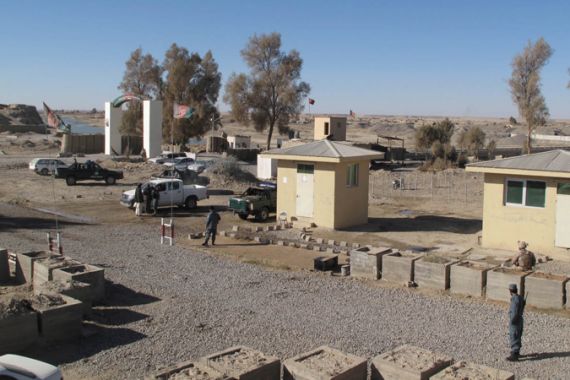Afghanistan’s south rocked by deadly attacks
Seven attackers killed in assault on NATO base as Helmand and Kandahar provinces hit by wave of attacks over 24 hours.

Eleven Taliban fighters have struck two Afghan and NATO bases in Kandahar province, while a NATO soldier was also killed in the troubled south, officials say.
Seven armed men stormed a joint Afghan-NATO base in Shah Wali Kot district at around 3:30am (23:00 GMT Monday), sparking a 30-minute gun battle that left all the attackers dead, Kandahar governor’s spokesman Jawed Faisal said.
Al Jazeera’s Bernard Smith, reporting from Kabul, said the attackers “breached the perimeter security fence” of the base but no coalition soldiers were killed.
But Faisal and provincial police chief General Abdul Raziq said a foreigner had been killed and two wounded, with Faisal describing the fatality as a civilian contractor. Their nationalities were unclear.
Hours later, four armed men wearing police uniforms struck a police and NATO base in Kandahar city, triggering a firefight in which four officers and the attackers were killed, Raziq said.
Nine police were wounded, he said.
Green-on-blue incidents
Police witnesses said the attackers all had the uniform and equipment of regular officers, and were led into the base by a police captain who fled afterwards. Two other officers were arrested over the assault.
ISAF said one of its soldiers died following another alleged Taliban attack in southern Afghanistan on Tuesday, but did not give details of the incident or its location.
The attacks came a day after men wearing Afghan police uniforms opened fire on NATO soldiers in Kandahar, killing one before fleeing.
That incident brought to 23 the number of Western troops killed in 17 so-called green-on-blue incidents so far this year in Afghanistan, where 130,000 foreign soldiers are helping Kabul fight the Taliban.
“The International Security Assistance Force confirms that three individuals in Afghan police uniforms turned their weapons against coalition service members in southern Afghanistan yesterday, killing one ISAF service member,” the alliance said.
A police official in Zhary district said the dead soldier was American, but there was no immediate confirmation.
ISAF gave no further details of the incident or the soldier’s nationality, though most coalition forces in Kandahar are American.
An increasing number of Afghan troops have turned their weapons against NATO soldiers as the decade-long war has progressed.
Some of the assaults are claimed by the Taliban, who say they have infiltrated the ranks of Afghan security forces, but many are attributed to cultural differences and antagonism between the allied forces.
The last such incident occurred in May, when Afghan police officers killed two British soldiers in Helmand.
‘Guardian angels’
The US-led ISAF has taken security measures in response to the shootings, including assigning “guardian angels” – soldiers who watch over their comrades as they sleep.
Tuesday’s violence came as Afghanistan’s attorney general accused Pakistan over an unprecedented bloody sectarian suicide attack in Kabul last December that killed more than 80 Shia Muslims on their holiest day.
Eshaq Aloko said the assault was planned in Pakistan’s northwestern city of Peshawar and masterminded by “some spy agencies in our neighbouring countries”.
Many in Afghanistan accuse Pakistani intelligence of supporting Islamist armed groups, who have strongholds in Pakistan, and of failing to cut their historic ties to the Taliban.
On Monday, a Taliban roadside bombing killed eight civilians, including women and children, in the southern province of Helmand, the interior ministry said.
President Hamid Karzai condemned the civilian deaths, saying the attack showed the fighters’ “true face of brutality”.
The Western coalition is to hand responsibility for security to Afghan forces by mid-2013 and play a support role up to the final withdrawal by the end of 2014.